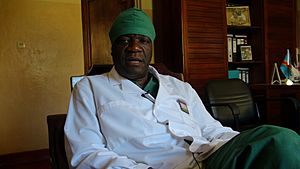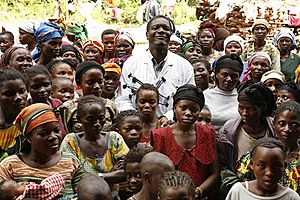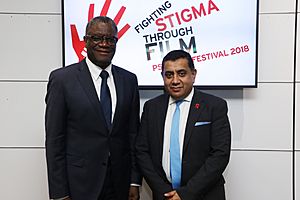Denis Mukwege facts for kids
Quick facts for kids
Denis Mukwege
|
|
|---|---|
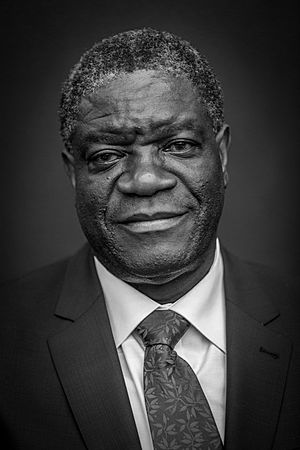
Mukwege in 2014
|
|
| Born | 1 March 1955 Bukavu, Belgian Congo
|
| Education | University of Burundi (MD) University of Angers (MA) Université libre de Bruxelles (PhD) |
| Years active | 1983–present |
| Relatives | Mushaga Bakenga (nephew) |
| Awards | Nobel Peace Prize Human Rights First Civil Courage Prize Wallenberg Medal Right Livelihood Award Four Freedoms Award Time 100 Sakharov Prize Seoul Peace Prize UN Prize in Human Rights Olof Palme Prize Gulbenkian Prize Legion of Honour |
Denis Mukwege (born March 1, 1955) is a doctor from the Democratic Republic of the Congo. He is a gynecologist, which means he specializes in women's health. He also founded and works at Panzi Hospital in Bukavu. In 2018, he won the Nobel Peace Prize along with Nadia Murad. They received the award for their efforts to stop the use of violence against women in wars and conflicts.
Mukwege has helped thousands of women who were hurt during the Second Congo War. He often performs many operations each day. He has received threats because he speaks up for justice for victims of conflict in Congo. In October 2023, he ran for president in his country.
Contents
Early Life and Education
Denis Mukwege was born in Belgian Congo on March 1, 1955. This country is now known as the Democratic Republic of the Congo. He was the third of nine children. His father was a minister.
When he was born, he almost died from an infection. A Swedish missionary and midwife named Majken Bergman saved him. Denis decided to become a doctor after seeing how much women in Congo suffered during childbirth. They did not have access to proper healthcare. He also wanted to heal people his father prayed for.
Becoming a Doctor
Mukwege earned his medical degree from the University of Burundi in 1983. He first worked as a children's doctor at Lemera Hospital. But he saw many women in pain because they lacked good care. This made him decide to study gynecology and obstetrics. These fields focus on women's health and childbirth.
He studied at the University of Angers in France. He finished his studies in 1989. Swedish Pentecostal missions helped pay for his education. Later, in 2015, he earned a PhD from Université libre de Bruxelles.
His Work at Panzi Hospital
After finishing his studies in France, Mukwege returned to Lemera Hospital. But during the First Congo War, the hospital was attacked. His patients and co-workers were killed, and the hospital was destroyed. Dr. Mukwege then moved to Bukavu.
In 1999, he founded Panzi Hospital there. Christian aid groups and the Swedish International Development Cooperation Agency helped fund its building. The hospital still gets support from the Swedish Pentecostal Mission.
Helping Many Patients
Since it opened, Panzi Hospital has treated more than 82,000 patients. A German medical group called DIFAEM also supports Mukwege's work. They provide money and medicines.
To help the hospital even more, the Panzi Foundation DRC was created in 2008. This group offers legal help, emotional support, and programs to help people earn a living. Later, Panzi Foundation USA was started to raise money in the United States. In 2016, the Mukwege Foundation was created to support the hospital's goals worldwide. Dr. Mukwege believes in treating the whole person, not just their physical injuries.
Other Important Activities
Denis Mukwege decided to become a minister like his father when he was 13. This was a very important moment for him. He said he felt a strong connection and knew his life had changed. Besides being a doctor, he also serves as a minister in a church in Bukavu.
Mukwege often says his Christian faith is the main reason he does his work at Panzi. The Panzi Hospital is run by the Congolese Pentecostal movement. It has always been supported by the Swedish Pentecostal movement.
City of Joy
Dr. Mukwege also helped create the City of Joy with Eve Ensler and Christine Schuler Deshryver. This special place supports women who have been treated at Panzi Hospital.
The City of Joy helps women heal from emotional pain. It also teaches them important life skills and leadership training. This helps them succeed when they return to their communities. The City of Joy opened in 2011. A Netflix documentary about it was released in 2016.
Personal Life
Denis Mukwege is married to Madeleine Mapendo Kaboyi. They have five children together.
Recognition and Awards
Denis Mukwege has received many important awards for his work.
Key Awards
- UN Human Rights prize (2008)
- Olof Palme Prize (2008)
- Chevalier de la Légion d'Honneur (France, 2009)
- Wallenberg Medal (2010)
- King Baudouin International Development Prize (2011)
- Clinton Global Citizen Award (2011)
- Civil Courage Prize (2013)
- Right Livelihood Award (2013)
- Sakharov Prize for the Freedom of Thought (2014)
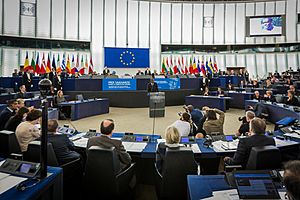
- Gulbenkian Prize (2015)
- Four Freedoms Award (2016)
- Seoul Peace Prize (2016)
- Time magazine's 100 Most Influential People (2016)
- Nobel Peace Prize, with Nadia Murad (2018)
- Aurora Prize for Awakening Humanity (2024)
He has also received many honorary degrees from universities around the world. These include degrees from Harvard University, University of Edinburgh, and University of Pennsylvania.
Documentary Films
Several films have been made about Denis Mukwege's work:
- Angèle Diabang Brener 2014: Congo, un médecin pour sauver les femmes (in French).
- Thierry Michel and Colette Braeckman 2015: The Man Who Mends Women: The Wrath of Hippocrates.
See also
 In Spanish: Denis Mukwege para niños
In Spanish: Denis Mukwege para niños
 | Janet Taylor Pickett |
 | Synthia Saint James |
 | Howardena Pindell |
 | Faith Ringgold |


